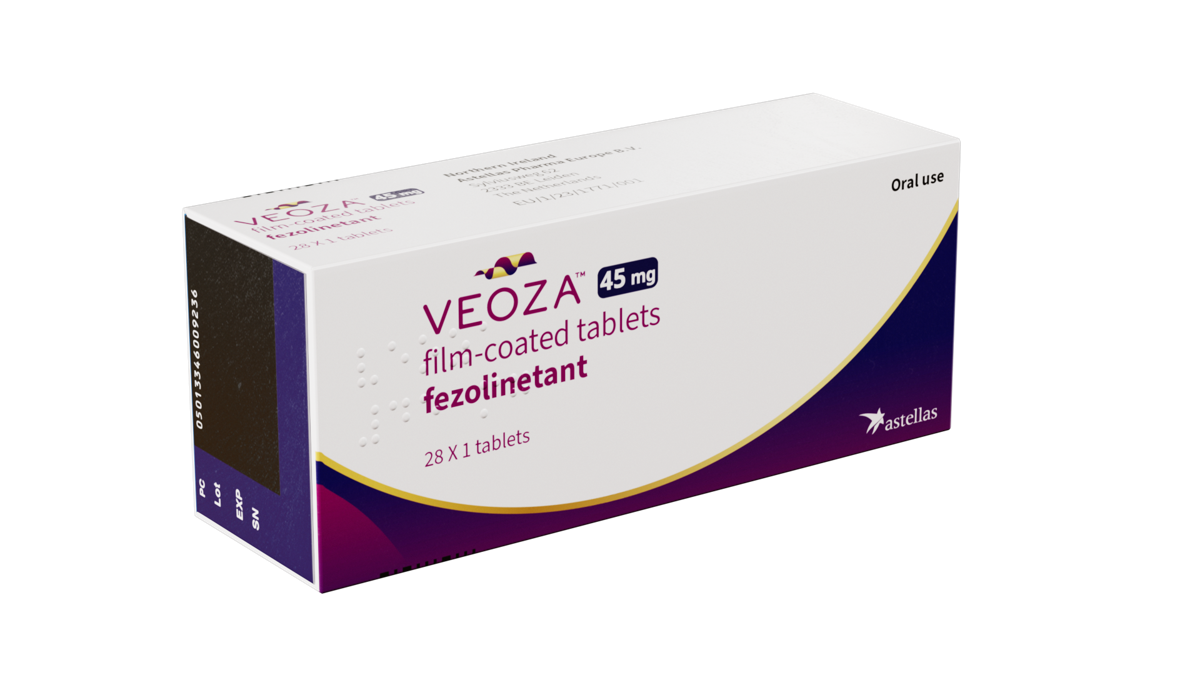
Veoza, the brand name for the new medicine Fezolinetant, is a new treatment for hot flushes now available on private prescription in England. We give you the facts.
To speak to Dr. Wilson about whether Veoza may be an option for you, click here.
What is Veoza?
The active ingredient in Veoza is the drug Fezolinetant. It treats moderate to severe hot flushes associated with menopause.
Does it contain hormones?
No. It doesn’t contain hormones, which makes it a really helpful addition to current treatment options. It provides an option for women who can’t have HRT, who don’t want it or have tried it and decided it’s not for them. It works on receptors in the brain – the neurokinin 3 system – to reduce the severity and frequency of hot flushes. It works directly on the brain centre controlling temperature.
How often do I take it?
Veoza is a 45mg tablet taken once a day, with or without food. It comes in boxes of 28 tablets.
How well does it work?
In the SKYLIGHT-2 study, Veoza reduced the frequency and severity of hot flushes by 65% on average, compared with 45% for women taking placebo.
Are there any side-effects?
The most common reported side-effects were insomnia (3%) and diarrhoea (3.2%).
Is monitoring required?
A very small proportion of women had a change to their liver function after starting Veoza (2.1%), compared with 0.8% for those given the placebo (dummy pill). This did not cause symptoms and completely resolved on stopping the medicine. In some cases, it even resolved while continuing to take the medicine. However, women who already have or are suspected of having a liver disorder should have a blood test to check liver function every 3 months while taking Veoza.
How much does it cost?
The medicine costs around £60 per month. If you have not been seen by Dr. Wilson before you will need a new patient appointment prior to obtaining your prescription. You will then need a follow-up appointment around 12 weeks to review how it is working for you. If you need a blood test, we can help you arrange private blood tests if you cannot get these at your GP surgery.
Is Veoza available on the NHS?
Veoza is not yet available on the NHS but is available privately. It is currently going through assessment by NICE and if approved, will then become available on the NHS
Who can’t take Veoza?
For most healthy women around the time of menopause, it will be an option. However, caution is required in the following situations:
-Veoza has not been studied in women over 65 years of age
-It should not be used in women with severely reduced kidney function (eGFR <30ml/min)
-It should not be used in women with moderate to severely reduced liver function.
-It should not be taken if you are pregnant or breast-feeding.
-It should not be taken alongside HRT as oestradiol can increase levels of Veoza in the blood. If you are already on HRT and wish to continue taking it, you should therefore NOT take Veoza as well.
-It is important to cross-check interactions with any other medicines you are taking before starting. Your doctor would check this with you.
-The medicines to look out for are those that inhibit the enzyme CYP1A2. Taking Veoza alongside these medicines increases its level in the blood. Note that this list includes oestrogen-containing contraceptives, antibiotics containing Ciprofloxacin, the antiviral Acyclovir and other medicines that you may only take for a short time. You should therefore tell health professionals treating you that you are taking Veoza before they prescribe any new medicines.
Can I take Veoza if I have had breast cancer?
It is important to be aware that Veoza hasn’t be studied specifically for safety in women with a history of breast cancer or other cancers. However, Veoza has not been shown to affect hormone levels. The best course of action would be to have a discussion with your doctor and oncologist about the likely benefits of taking the medicine in the absence of this information.
Can I have Veoza if I have epilepsy?
There are no specific studies of Veoza in women with epilepsy. The decision whether to take Veoza should be made following a discussion with your doctor about the benefits in the absence of this information.
References
Clinical trials: Skylight-1 2023 ; Skylight 2 2023
News articles: British Menopause Society statement; The Guardian – “Game-changing drug to prevent hot flushes wins approval in the UK”. Dec 2023; BBC announcement Dec 18th 2023


